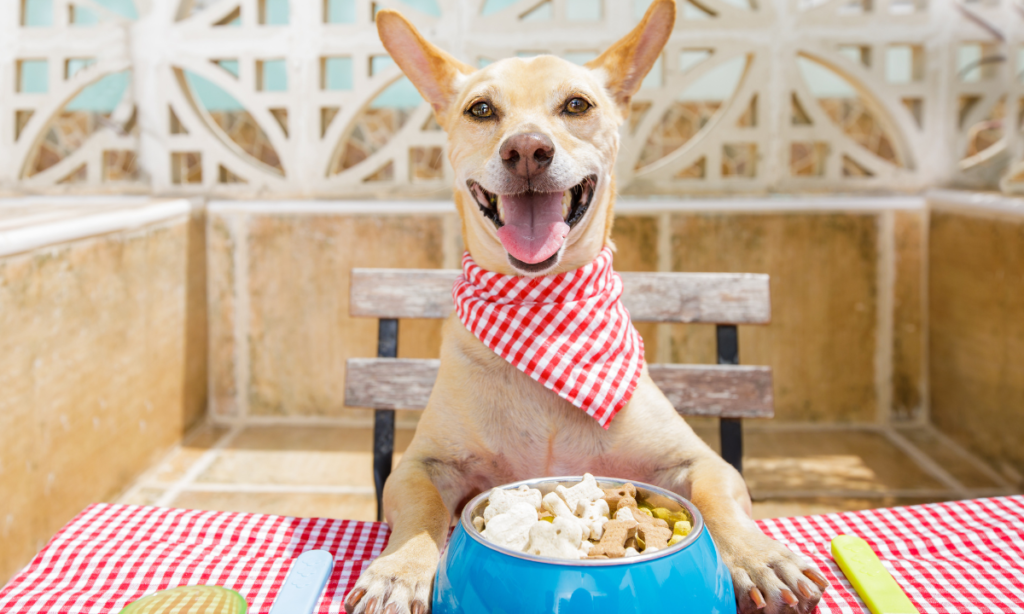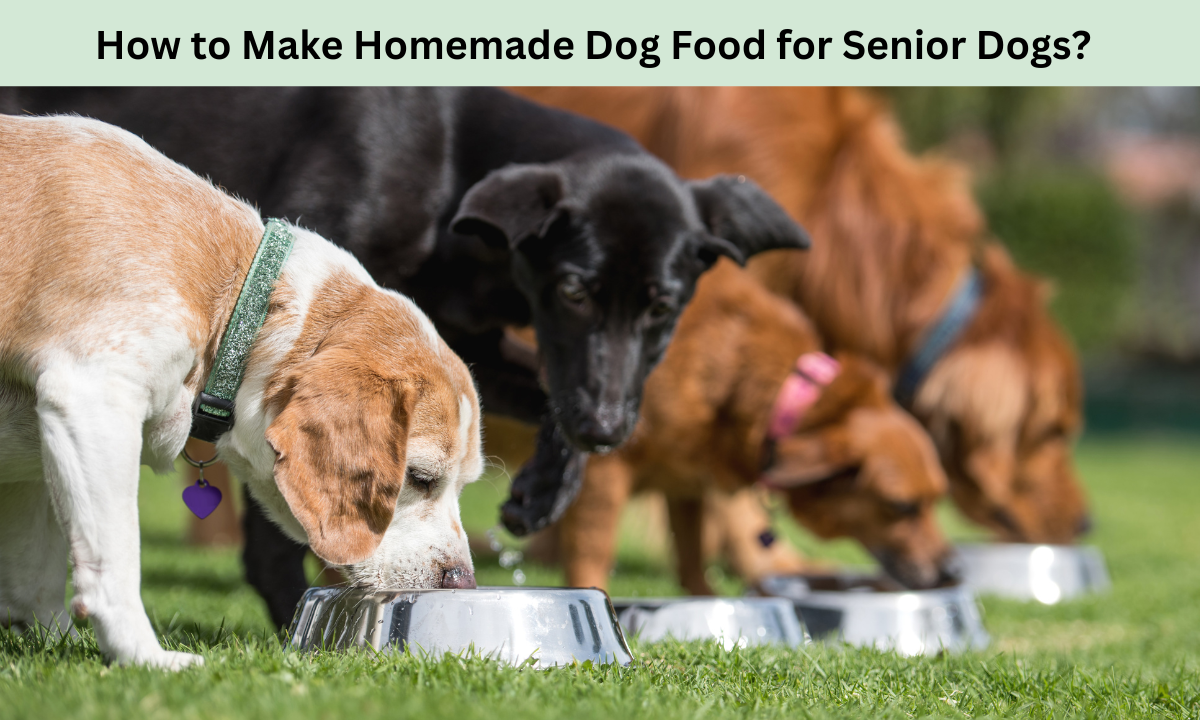As dogs age, their nutritional needs change. Their digestion becomes weaker, and they are more prone to illnesses. In such a situation, taking extra care of their diet is important. Homemade food allows us to control the ingredients and customize it according to their requirements. This article discusses how to make homemade dog food for senior dogs.
Tips on Making Homemade Dog Food For Senior Dogs

Below, we have mentioned a few tips on How to make homemade dog food for senior dogs:
Choosing a Protein Source
As senior dogs require easy-to-digest protein, choose lean meat sources like chicken, beef, or salmon. Chicken is light and ideal for elderly dogs. Diced or shredded chicken breast can be used. Beef is also a good option, but it should be lean cuts only. Even fish like salmon provide omega-3 fatty acids that support joint health. Avoid red meat, which is difficult to digest. Eggs are another easily digestible protein you can use by boiling and mashing the content.
Include Carbohydrates
Rice, oats, and veggies provide carbohydrates for energy. Boiled rice can be given to senior dogs as they find it easy to chew and swallow rice grains. You can add some cooked oats, whole grains, chicken, and rice. You can also add steamed or boiled carrots, green beans, or potatoes that provide fiber, antioxidants, and vitamins. Chop these into small, bite-sized pieces that are easy for them to eat.
Add Supplements
As senior dogs are prone to joint issues, add fish oil, turmeric, or ginger powder, which have anti-inflammatory properties. Fish oil supplementation provides omega-3 fatty acids that support brain health and mobility. Similarly, turmeric and ginger powders act as natural anti-inflammatory agents and help alleviate joint pains. You can also add a calcium and vitamin D supplement or bone meal powder for healthy bones and teeth. These supplements ensure our senior furry friends get complete nutrition.
Homemade Meal Plan
A sample homemade meal plan for senior dogs could include:
- Breakfast: Boiled chicken or egg mash with oats and carrots.
- Lunch: Boiled rice and chicken along with green beans and salmon oil supplement.
- Dinner: Boiled or steamed potato and chicken pieces with added turmeric and calcium powder.
This balanced homemade food provides easy-to-digest protein, complex carbs, and supplements to meet the nutritional needs of aging dogs. Serve in multiple small meals rather than one large portion.
Cooking the Food
It’s time to cook the food once all the ingredients are chopped and measured. For protein items like chicken or eggs, boil them until fully cooked. This makes it soft and easy to eat. For vegetables, steam or boil them lightly until just tender. Overcooking makes them lose nutrients.
For carbohydrates like rice and oats, boil in water until soft. For a balanced meal, mix all the cooked ingredients. You can also puree some parts if your dog has weaker teeth. Cool it completely before storing it in an airtight container in the fridge for 3-4 days.
Feeding Schedule
As senior dogs tend to eat smaller quantities, divide the total into 3-4 smaller meals rather than one large meal. Space them evenly – for example, breakfast, lunch, and dinner. You can offer smaller snacks in between as well. This keeps them feeling full and energized throughout the day. Always serve the food simultaneously each day to maintain a schedule. Leave the meal for 15-20 minutes and take away leftovers to avoid overeating. Offer plenty of water, too, to keep them hydrated.
Storing and Freezing
For homemade dog food that won’t be used within 3-4 days, divide the full recipe quantity into smaller portions for 1-2 meals. Use wide-mouth containers to freeze individual portions flat so they stack well. Label them clearly with the date and contents. Frozen meals stay good for 2-3 months. Thaw before serving. Take out only what’s needed on feeding days and return the rest to the freezer. This makes meal preparation easy without food waste.
Homemade Treats for Senior Dogs
Along with a balanced diet, seniors enjoy tasty homemade treats, too. Make easy-to-digest, soft mini treats from banana, pumpkin, or sweet potato puree mixed with peanut butter. Roll balls and top with oats. You can also use cooked and mashed carrots, boiled chicken, or hard-boiled eggs to make treats your senior furkid will love. Offer treats sparingly – a few daily pieces are enough to keep them happy.
Dealing with Picky Eaters
Some senior dogs lose their appetite due to age. If your furry friend refuses to eat, don’t force it; it will create negative associations. Instead, try warming the food slightly in the microwave as it enhances aromas. You can also mix in some low-fat broth or gravy. Add healthy toppers your dog enjoys – small bits of chicken, cheese, or peanut butter. Feed in a quiet place without distractions. Break meals into smaller portions throughout the day. Consult your vet in case of consistent refusal, which can indicate health issues.
Dental Care
Daily dental hygiene is important for senior pups. After meals, wipe their teeth and gums with gauze or a toothbrush dipped in saline solution. This keeps plaque and tartar at bay. You can also offer raw chicken wings and bones, which help scour their teeth naturally. Avoid hard chews that can crack aged teeth. Regular dental checkups catch issues early. Brushing is best, but even gentle massage helps circulation in geriatric dogs. Fresh breath boosts their overall well-being, too.
Conclusion
Aging is a natural process, but we can ensure our senior dog companions are healthy and happy during their golden years through proper nutrition and care. We can customize it according to their requirements by making simple yet balanced homemade dog food for senior dogs. This helps them stay energetic with improved joint mobility. Most importantly, it strengthens our bond with our loyal furry friends during their final years.
Frequently Asked Questions (FAQs)
Q 1: Why should I make homemade food instead of store-bought?
Ans 1: When dogs get old, their appetites and nutritional needs change. Homemade food allows you to adjust ingredients based on your furry friend’s condition. You control what goes in, ensuring complete, balanced nutrition tailored for seniors. Commercially made food doesn’t provide this customization option. Home cooking also strengthens your bond with your aging companion.
Q 2: Can’t I just add supplements to regular dog food?
Ans 2: While supplements can complement regular dog food, a well-balanced homemade meal ensures all nutrient requirements are fully met. Seniors absorb fewer nutrients, so that pre-made food may lack key minerals and vitamins. Homemade allows adjusting portions as appetites vary. Added supplements are best given separately from regular food for better absorption.
Q 3: How much should I feed my senior dog each meal?
Ans 3: Portion sizes depend on your dog’s size, age, and activity level. Divide the total daily allowance for seniors into 2-4 small meals rather than one large serving. Start with 1/4 to 1/2 cup per meal for tiny dogs and up to 1 cup for larger pets. Monitor weight and adjust as needed under vet guidance. Leaving meals for limited times prevents overeating.
Q 4: Can I still exercise my old dog?
Ans 4: Moderate physical activity is very important for senior dogs’ well-being. Tailor exercises to your dog’s mobility and stamina instead of what they could do in youth. Short walks, swimming, or gentle play are excellent. Always warm them up and cool them down to prevent stiffness. Don’t push them past their limits; take rest days in between. Keeping seniors active is key for joint health and mental stimulation in their golden years.
Also read
- Healthy Pancreatitis Dog Food Recipes 2024
- Effective Pomeranian Dog Care Tips: What You Need to Know
- Best Ideas For Dog Food Storage 2024


